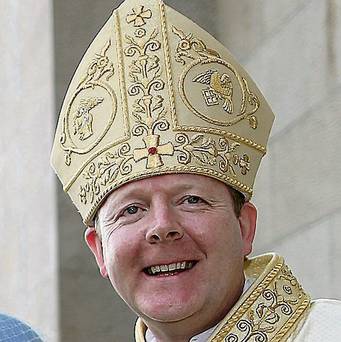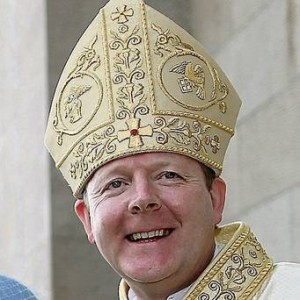DERRY-BORN Archbishop Eamon Martin has told crowds at the Marian Shine in Knock that the Catholic Church stands by its position on the sanctity of marriage between a man and a woman.
Archbishop Martin said the Church disagreed with changing the Constitution of Ireland to allow gay marriage to take place.
But he respects the result saying “people voted in favour of the amendment believing it to be a way of showing tolerance and respect towards gay people, including family members and friends.”
In his opening address, the Primate of Ireland said:
“Among the many lessons that we as Church can learn from the referendum debate is to re-commit ourselves to the pastoral care of anyone in society who experiences victimisation and stigmatisation … to reach out pastorally to different kinds of families and relationships while at the same time continuing to be advocates for a Christian vision of marriage and for the unique and fundamental contribution to society of the family founded upon the love and marriage of a man and a woman … As Pope Francis saidon Friday: ‘Evangelise with the message of merciful love” – Archbishop Martin
Homily
“Everyone has their favourite Gospel passage, and mine has just been read – the final five verses of Matthew’s Gospel in which Jesus says farewell to his disciples:
“The eleven disciples set out for Galilee, to the mountain where Jesus had arranged to meet them. When they saw him they fell down before him, though some hesitated. Jesus came up and spoke to them. He said, ‘All authority in heaven and on earth has been given to me.
“Go, therefore, make disciples of all the nations; baptise them in the name of the Father and of the Son and of the Holy Spirit, and teach them to observe all the commands I gave you. And know that I am with you always; yes, to the end of time.”
“It’s Matthew’s big finale – you almost expect to hear the trumpet fanfare and see the credits roll … ‘The End’!
“But of course it’s not the end. It is just the beginning. Jesus did not say to his friends: ‘It’s all over now; you can go back to your fishing, or farming or whatever’. Instead He gave the disciples a ‘Great Commission’ to go and make disciples of all the nations. To them it must have seemed a ‘mission impossible’! Acts of the Apostles tells us that they stood there transfixed until two men in white appeared and said: ‘Men of Galilee why are you standing there gazing into the sky?’ – as if to say – ‘There’s work to be done! Get on with it! This is your time!’
“Two thousand years later the Great Commission applies also to us as witnesses of Christ. We too are called to bring His message, with all its power and challenge, into our country and world. For us it might also seem at times to be a ‘mission impossible’. But let us look more closely at those final words of Jesus.
“Firstly; notice that Jesus was speaking with authority: ‘all authority in heaven and on earth has been given to me’.
“Secondly; the ‘Great Commission’ is not narrow or confined to those who are like-minded with us. Jesus sends His disciples to bring people everywhere into a personal relationship with Him through baptism.
“Thirdly; Jesus expects something of His followers. He says: ‘Teach them to observe all the commands I gave you’. He was reminding His disciples of His earlier words: ‘If you love me, keep my commandments’.
“Fourthly then; being a follower of Jesus means accepting a share of His Cross in your life. He asks that people be baptised with the Sign of the Cross: in the name of the Father, and of the Son and of the Holy Spirit.
“But finally, Jesus reassures us not to be afraid of the challenges that await us as His followers: ‘Know, I am with you always’, He promises, ‘yes, to the end of time’.
“Down the centuries Irish men and women have responded generously to the Great Commission. Many of us have relatives or neighbours who quite literally went to ‘make disciples of all the nations’ as members of Irish missionary societies.
“This year we are celebrating the 14th centenary of the death of the great Saint Columbanus – perhaps Ireland’s most famous missionary ever. It would be great if in this anniversary year we could rekindle Ireland’s missionary spirit so that more people can experience the joy and challenge of a personal relationship with Jesus Christ. In that sense Ireland itself is mission territory!
“Talking like this about the Catholic Church in Ireland being confident and missionary might seem to some to be ‘pie in the sky’. Various commentators since last week’s marriage referendum have suggested that the Church has lost its way.
“During the past week I have received many messages and letters about the referendum. Some accuse the Church of not doing enough to stop the amendment; others take the opposite view, criticising the Church for trying to stridently to present a message that, they say, was out of touch with the people.
“The Catholic Church contributed its views about the referendum because we considered it to be an extremely important issue for society. Bishops undertook to inform voters both nationally and locally by explaining, from faith and from reason, the Church’s position on marriage and why we disagreed with changing the meaning of marriage in the Constitution of Ireland. At the same time we emphasised that gay people should always be treated with respect and sensitivity.
“I would like to affirm those who spoke up courageously and chose to vote in support of the unique union of marriage between a man and a woman and the dignity of difference between male and female. I am also conscious, from the correspondence that I have received, that many people were conflicted about how to vote. It is clear from the reaction to the referendum result that many people voted in favour of the amendment believing it to be a way of showing tolerance and respect towards gay people, including family members and friends.
“It is good that the discussions surrounding the referendum have helped the people of this country to become more aware of the alienation and isolation often experienced by gay people. Among the many lessons that we as Church can learn from the referendum debate is to re-commit ourselves to the pastoral care of anyone in society who experiences victimisation and stigmatisation.
“As disciples responding to the Great Commission, we have much to reflect on, and to learn from the referendum debate about presenting and communicating the Church’s message in the 21st century. We earnestly want to find ways of reaching out pastorally to different kinds of families and relationships while at the same time continuing to be advocates for a Christian vision of marriage and for the unique and fundamental contribution to society of the family founded upon the love and marriage of a man and a woman.
“The changed social and political climate in Ireland brings new pastoral realities for the Catholic Church which presents us with fresh challenges. We need not be daunted by these challenges, nor stand around like the first disciples staring into the sky. There is work to be done! We must get on with it! This is our time!
“In post-referendum Ireland the duty of proclaiming the ‘Gospel of the Family’ and caring for the ‘covenant of marriage’ remains with each member of the Church – lay, ordained or consecrated. With the help of the Holy Spirit, and strengthened by prayer, we can face squarely today’s pastoral realities, neither giving in to despondency, nor opting for simple vilification of those who disagree with us.
“I hope and trust that the Catholic Church shall continue to have an important voice in discussions in the public square on a range of matters, particularly those relating to human life, the dignity of the person, the family, care for the poor and marginalised, the environment, justice and peace.
“In these debates we will use arguments drawn from faith and reason, at all times trying to balance charity and truth. I am often guided in these matters by Pope Saint John XXIII’s suggestion that, rather than issuing condemnations or ‘severer remedies’, the Church should always use ‘the medicine of mercy’, to prove the truth of her teachings. As Pope Francis said on Friday: ‘Evangelise with the message of merciful love’.
“The Catholic Church is not here to impose, but to invite people to a personal relationship with Jesus which, in turn, calls them to conversion and change in their lives. The Second Vatican Council put it this way: ‘The truth cannot impose itself except by virtue of its own truth, as it makes its entrance into the mind at once quietly and with power’ (Declaration on Religious Freedom, Dignitatis Humanae).
“I am emboldened by the way Pope Francis keeps talking about the need for a ‘missionary impulse’ in the Church which is capable of transforming everything that we do. He says:
“I prefer a Church which is bruised, hurting and dirty because it has been out on the streets, rather than a Church which is unhealthy from being confined and from clinging to its own security’. This is none other than the radical call of Jesus to mission and evangelisation: ‘Go out to the whole world and proclaim the Good News’.
“When I was ordained bishop, I chose for my episcopal motto the beautiful words from the psalms: ‘Sing a new song to the Lord’. Many people have asked me: ‘What is this new song?’ I do not think the ‘new song’ means changing the words or message – because we must always remain faithful to the Gospel.
“Nor does it mean simply changing the melody or tune to make it more catchy and popular – we must beware picking and choosing only the ‘easy listening’ bits of the Gospel message.
“I prefer Pope Francis’ suggestion that the Church must put everything it does in ‘a missionary key’. Perhaps this is what ‘Sing a new song’ means for the Church in Ireland at this time – to find fresh ways of presenting the timeless and challenging truths of the Gospel to the complexity of today’s world where people are being constantly bombarded with all sorts of contradictory messages.
“Pope Francis says, “Pastoral ministry in a missionary key seeks to abandon the complacent attitude that says: ‘We have always done it this way’. It invites everyone to be bold and creative in this task of rethinking the goals, structures, style and methods of evangelisation in their respective communities” (Evangelii Gaudium 33,The Joy of the Gospel – apostolic exhortation of Pope Francis published in November 2013).
“Standing here today in the magnificently restored Basilica at Knock, I want to thank Father Richard Gibbons and all those who have been involved in the ‘Witness to Hope’ initiative.
“From the outset, this exciting project has recognised that the mission of the Church in Ireland is not about restoring old church buildings and structures. Rather it is about the future.
“It is about encouraging people to have a living and personal encounter with Jesus. It is about rekindling the light of Christian faith, love and hope in Ireland. We must not allow ourselves to be robbed of this hope! Remember Jesus promised ‘I am with you always, yes, until the end of time’. And here, in this special place, we turn to Mary for she is our life, our sweetness and our hope! Our Lady of Knock, Queen of Ireland, pray for us. Amen.
Tags:






